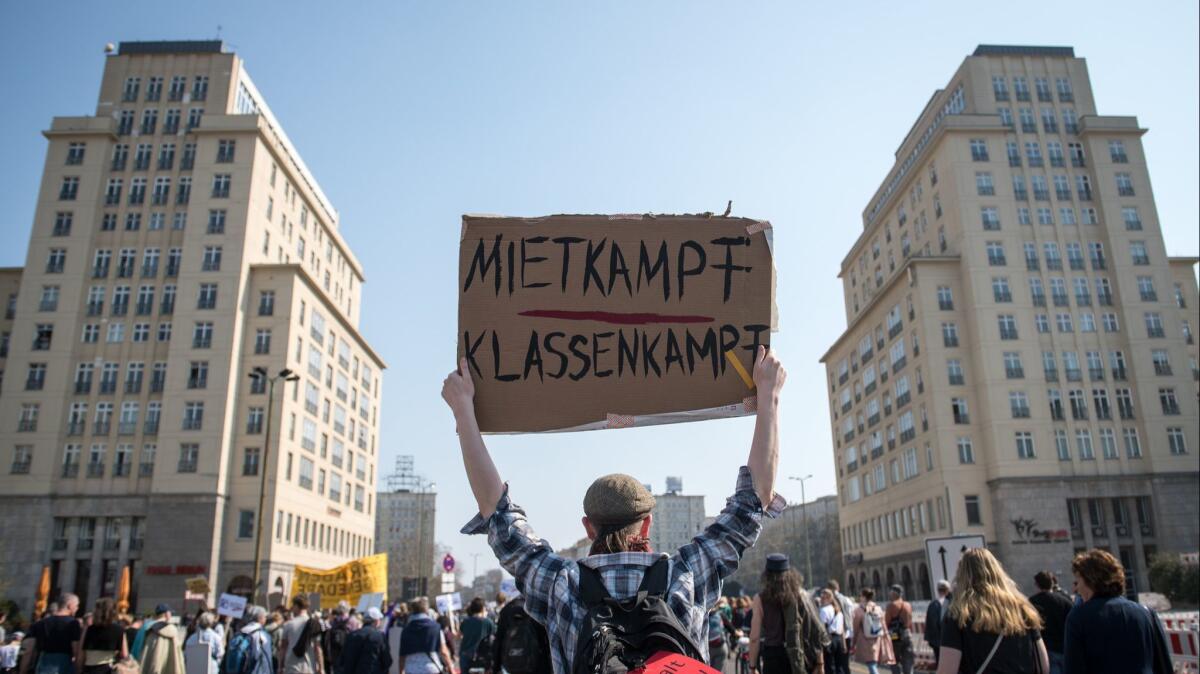In Berlin, rising rents fuel a movement urging city government to buy back apartments

Reporting from Berlin — As rental prices across Berlin soar, a grass-roots movement that aims to pressure the city government to take back ownership of apartment buildings it had sold off to private housing companies in the years after the fall of the Berlin Wall is gaining momentum.
Within five days of the launch of a petition drive last weekend, more than 20,000 city residents signed in support of the expropriation of some 200,000 apartments, aiming to stabilize prices on units that have been vacated and thus are not covered by the city’s otherwise strict rent control provisions. While organizers were initially seen as a fringe group seeking to bring back the days of communism, they have begun to win support from mainstream politicians who say it is indeed feasible to take the properties in a similar fashion to private land being cleared for highways through eminent domain.
The movement has begun to strike a nerve in the city of 3.7 million, who have long been blessed with cheap rents, even for cavernous apartments, a factor that has helped lure myriad newcomers and start-up businesses from around the world.
“The public’s skepticism towards free markets has been growing for years,” said Thomas Jaeger, a political scientist at Cologne University. “The talk of expropriating apartment buildings is taking that to an entirely new level.”
As a result of the petition, the City Council is now obligated to consider seizing the private properties, or the movement could force a referendum by collecting 170,000 signatures — representing 7% of voters who took part in the last council election. A similar referendum was held a decade ago on keeping open the city’s historic Tempelhof Airport, but it failed.
“There are 500,000 people in Berlin who would sleep better at night if they knew they wouldn’t have to worry about one day having to pay higher rents,” said Rouzbeh Taheri, the leader of the initiative, at a public debate Tuesday, referring to the approximate number of people who live in the 200,000 apartments at issue. “Apartments aren’t any ordinary tradeable goods like pork bellies. You bought up these apartments to drive the prices higher.”
Michael Zahn, chief executive officer of Deutsche Wohnen, the city’s largest private landlord, countered, “We are not going to let anyone expropriate our property. This isn’t a banana republic.”
Zahn, whose company owns 115,000 apartments in Berlin, said that the average monthly rent for a two-bedroom unit is currently $650.
Opponents of the measure argue that the $40 billion it might cost the city to buy back 200,000 apartments, in neighborhoods on both sides of where the Berlin Wall once stood, would be better spent building new public housing. Years of legal battles and delays in finding a resolution would also exacerbate a housing shortage, they say.
“Expropriating property would be really bad for Germany’s reputation and wouldn’t solve the housing shortage problem at all,” said Carsten Brzeski, chief economist at ING DiBa bank in Frankfurt, contending that the measure’s backers harbor romantic notions that state-owned apartment prices will stay lastingly low while ignoring the plight of newcomers to Berlin. “It would scare away investors in Germany and abroad, and it wouldn’t lead to a single new apartment being built.”
The Berlin activists have been riding a rising tide of frustration among the 3.1 million people living in rental units, roughly 85% of the city’s population. Even with long-standing rent control strictures for those who do not move, prices have nearly doubled on vacant units in the last decade due in part to the heightened housing shortage, particularly in the central city. According to one housing price data website estimate, a three-bedroom apartment that rented for $700 a month in 2011 would now cost $1,350 to rent.
At a rally last weekend, more than 35,000 people took to the streets of Berlin to attack political leaders for failing to solve the worsening problem.
The leader of Germany’s Greens party, Robert Habeck, is among those calling for state and local governments to use an expropriation clause in the constitution, known as Enteignung, even though it has never been used for apartments in the past. “It’s absurd to use that only to take away property to build highways but not to help alleviate the housing shortage,” he said in an newspaper interview Sunday.
An opinion poll by the Forsa institute found that 44% of Berlin’s residents believe it makes sense to nationalize apartments owned by large landlords, while 39% are opposed. In formerly communist east Berlin, support for the measure weighed in at 50%.
“The term ‘expropriation’ is certainly exaggerated because in reality the city would only be buying back apartments,” said Thorsten Faas, a political scientist at Berlin’s Free University. “But it shows how polarizing and mobilizing the question of affordable living is becoming. Whether you view it as ‘expropriation’ or not, it is the issue on the minds urban dwellers these days.”
Kirschbaum is a special correspondent.
Germany’s conservative party shifts away from Chancellor Merkel’s open-borders policy »
On Germany’s autobahns, ‘Geschwindigkeitsbeschraenkung’ is a four-letter word to many »
More to Read
Sign up for Essential California
The most important California stories and recommendations in your inbox every morning.
You may occasionally receive promotional content from the Los Angeles Times.










